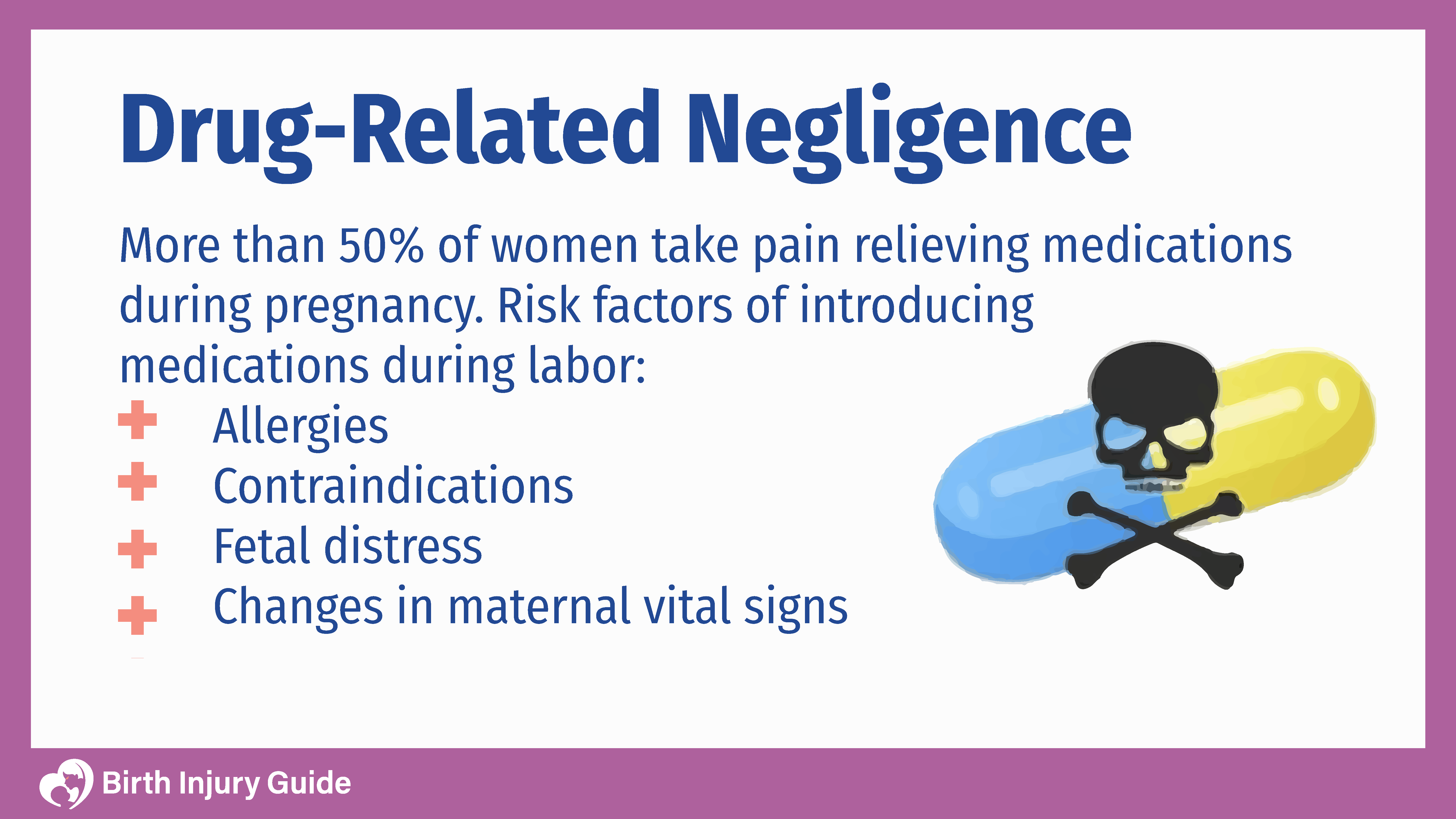
Drug-Related Negligence
Drug-related negligence is an unfortunate cause of birth injuries and birth defects. When your child is diagnosed with a birth injury – whether it be mild or severe- perhaps the most common and prevalent question is “How could this happen?” Parents want to place blame on themselves, thinking that maybe they didn’t do something right, or that they didn’t prepare appropriately.
The truth is that sometimes these birth injuries happen not at the fault of the parents, but at the fault of the healthcare providers.
What is Drug-Related Negligence?
One way that healthcare providers can negligently cause birth injuries is drug-related negligence.

Medication errors can affect the health of the mother and fetus. Examples of drug-related negligence includes:
- Giving a mother medication that is dangerous for the baby or may cause birth defects.
- Giving a ‘sound-alike’ medication to the mother instead of the correct medication.
- Administering an incorrect medication due to inability to read the prescribing doctor’s handwriting and not verifying the prescription.
- Off-label use of medications.
- Anesthesia-related errors.
Below, we will discuss these errors in more detail.
Types of Drug-Related Negligence
Giving the Mother Medication that is Dangerous to the Baby
Many prescription and over-the-counter medications have possible side effects. Many others are specifically dangerous during pregnancy. For example, medications like Prozac, Zofran, Depakote, Accutane and Paxil have all been linked to birth injuries or birth defects. Infants exposed to these medications may experience:
- Heart damage
- Brain damage
- Hearing problems
- Seizures
- Cleft palate
- Heart defects
Incorrect Dosage, Time or Patient
Birth injuries are known to happen when too much of a drug is administered during labor. Sometimes the nurse administers too much Oxytocin to the mother during labor, and sometimes the problem is a drug called Cytotec. This drug is not approved by the FDA to be used in the process of labor and delivery but some doctors and nurses will still use it because it works to ripen the cervix and to help promote labor. Birth injuries are known to be related to this drug, especially when too much of it has been administered to the mother. No drugs should be given in incorrect amounts or should be given too close to delivery.
Anesthesia-Related Negligence
There is always a risk when anesthesia is used. The anesthesiologist should not give the wrong amount of medication to the mother or to the baby, but it happens. In addition, the anesthesiologist should know that there are different kinds of anesthesia for different patients, and the doctor should be monitoring the patient (whether it’s the pregnant mother or the baby by his or herself) to keep an eye on the vital signs.
Anesthesia-related negligence could happen to the mother as she is pregnant and having some kind of procedure done (usually an emergency surgery isn’t recommended for pregnant women), if the mother receive anesthesia for a c-section, or if there is a complication and the baby is put under anesthesia at birth.
Epidural-Related Negligence
Your doctor should have warned you that an epidural can occasionally affect the baby. While an epidural is an extremely popular pain reliever for mothers, there are various risks to both mother and baby.
Babies who were born after the mother had an epidural are 2 to 6 times more likely to have high fevers. Mothers are at risk for long-term back problems, low blood pressure, severe headaches and permanent nerve damage.
Defective Equipment
A number of different medicine-administering machines could be used for the mother and the baby. Some machines are used to administer birth-related drugs to the mother, and some machines could be used on the baby to administer vaccinations. Sometimes too much of something is given, and sometimes a medicine is given at the wrong time. Both mistakes are usually because of the malfunction of the machine. If this happened to you and your child has suffered a birth injury due to a malfunctioning machine, your medical provider is still responsible for the injury as the machine is supposed to do their job for them –not injure your child.
Getting Help with Drug-Related Negligence Concerns
If you believe that your child’s birth injury or defect is the result of drug-related negligence, it is important to explore your legal rights and options. At Birth Injury Guide, we can help you. Call us to find out more about how you can hold accountable those responsible for your child’s birth injury or defect.
Start Your FREE Case Review Today
If you or your child is injured as a result of medical negligence, call us to learn more.



